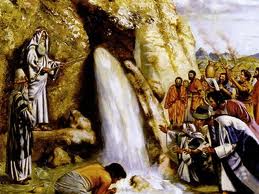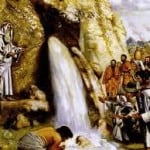What is the meaning of God’s instruction to Moses to speak to the rock? Can rocks hear us?
The short answer is — yes! Nature and all of its laws are listening. They listen for the call of redemption. They yearn for the redemptive light that preceded the creation of the universe. When this unifying light is revealed, the world’s divided factions become linked and bound to their underlying foundation.1
As Moses approached to speak to the rock, all of creation was listening. Tragically, instead of speaking, Moses hit the rock. The waters, meant to revive and nourish the people, instead became Mei Merivah — ‘Waters of Dispute,’ bringing conflict and discord into the world. With his impatience and anger, Moses introduced a framework of coercion and force into the world, thus debasing the universe. The world was no longer ready to listen in attentive quietude to the inner voice of the Infinite.
The paradigm shifted from speaking to striking, from receptive listening to coercive force.
A World That Listens
This tragic discord will be healed through the Divine spirit that flows within the wisdom of Israel. The flowing waters of Israel’s wellspring — the Torah — will heal the discord of Mei Merivah. Every Jewish soul has a part in revealing this wisdom. It will arise powerfully, enabling the living word of God to penetrate all hearts. The return to patient communication will awaken the world’s latent state of listening in all its splendor.
“You have opened my ears… Then I said, ‘Behold, I have come, with a scroll of a book written for me.'” (Ps. 40:7-8)
We yearn for a world that listens with open ears, ears that are able to hear the inner call. We aspire for a world where our inner truth, the light of the Life of the worlds, is expressed, not through force and coercion, but through words and literature. “Behold, I have come, with a scroll of a book written for me.”
The Tikunei Zohar identifies the staff which Moses used to redeem the Jewish people as a pen. “‘The staff of God’ — that is the pen.” Moses’ staff, used to strike the rock, will be transformed into a tool of communication and dialogue. And the art of literature will flourish, redeemed from its waywardness.
(Sapphire from the Land of Israel. Adapted from Shemonah Kevatzim, book VII, section 28)
1″Those who rule over themselves and cleave to their Creator, utilizing the world only to aid them in serving the Creator — they uplift themselves and the universe with them…. It is like the statement of the Sages, that the rocks united together [to form a bed for Jacob], each one saying: Let the tzaddik rest his head on me.” (from Mesillat Yesharim, chap. 1)

